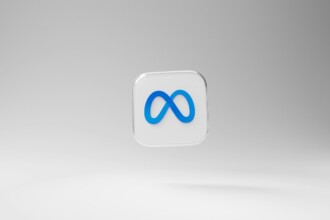Find out how does WorldRemit work and what fees it has
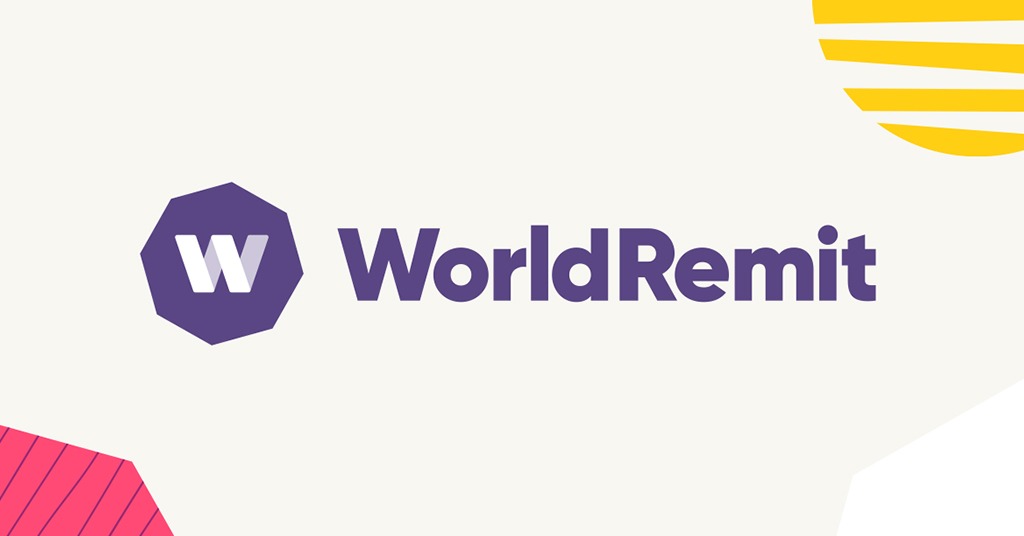
International money transfer services guide: WorldRemit. Source: facebook.com
When we speak of a need for international money transfers between individuals, the talk usually turns to immigrant workers. There are so many families around the globe where children, parents or spouses go abroad pursuing better earning opportunities, while they stay in their native countries. The family supporters need to send money to their dear ones regularly. This is a typical situation for developing nations.
At the same time, many of such transfers, especially in the developing world where cash is still king, take place via some agent (whether a bank, a shop, a post office, a foreign exchange office, or even informal unrecorded channels). All those intermediaries naturally charge for their services. As banks charge more and deal with a lot of paperwork, people often resort to unofficial agents. That harms both individual financial history and national economies. WorldRemit is a service aiming to legalize and facilitate as many of these international transfers as they can.
How it all started
The man called Ismail Ahmed came to London from Somalia to study. His first job was for a World Bank agricultural development project when he was still living in Hargeisa, Somaliland. Due to the World Bank scholarship, he attended the Executive MBA program at the London Business School and did a Ph.D. in development economics at Imperial College.
Before starting his own business, Ahmed worked for the UN Remittance Programme, helping African money transfer companies comply with anti-money-laundering rules. In a while, he realized that the only way for transparency and security of international transfers was digitalization.
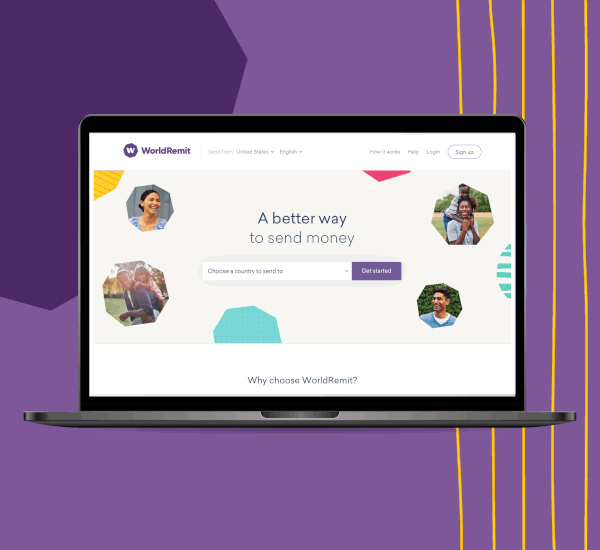
Find out how does WorldRemit work and what fees it has. Source: worldremit.com
He founded WorldRemit, an online money transfer firm in 2010. A few years later, it was named the best European money transfer company by the International Association of Money Transfer Networks. The company raised $100 million in a funding round in 2015 and has eventually increased its staff to 600 people in the UK, the US, Canada, New Zealand, Japan, and Australia.
This year, it has raised $175 million in a Series D round of funding from TCV, Accel, and Leapfrog. The business now covers 50 ‘sending’ countries and 150 ‘receiving’ countries, with around 4 million users, with the US (where it has a license to operate in all states) its biggest ‘sender’ market today.
How WorldRemit differs from usual money transfers
To begin with, the difference starts with the sender. World Remit only accepts funds electronically via its website or mobile phone app. When a person registers, the account moderators check your name, address, and date of birth. As a financially regulated company, WorldRemit is required by law to verify its customers. Therefore, you may be asked to upload a copy of your valid photo ID via the ‘contact us’ section.
The company security programs screen all the transactions against sanction lists, and they can pick out suspicious or unusual behavior almost immediately. For instance, trying out many bank cards to make your payment may be rated suspicious. Thus, in some circumstances, the system may also require further information. This can include the purpose of your transfer or source of funds.
While sending money happens in a 100% cashless mode, the recipients have a cash pick-up option (which is the only available solution for some countries). However, the company is at the forefront of digitalizing the receiving end of remittance exchanges, with cash pick-ups only accounting for one-third of its transactions, compared with 95% for the market as a whole.
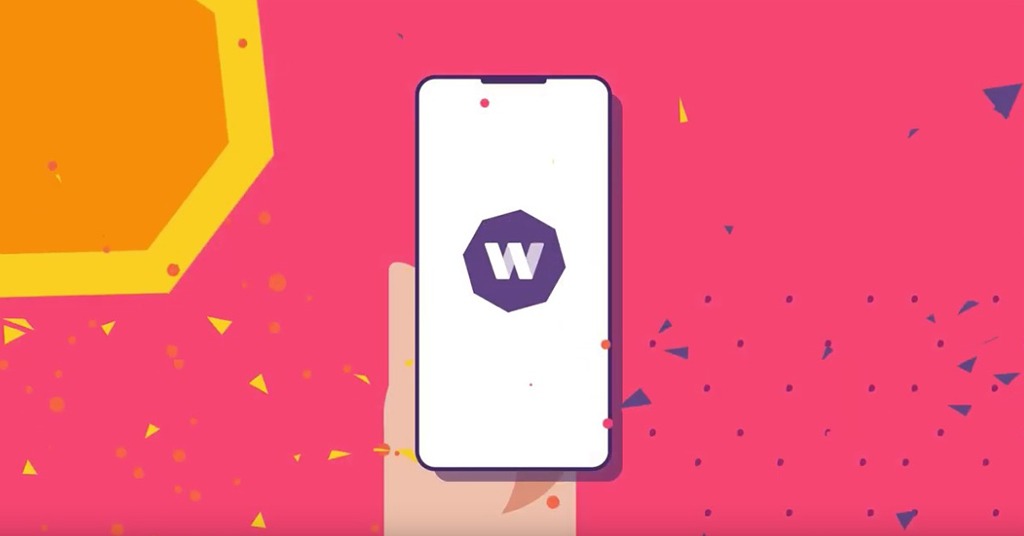
The recipients can get their remittance in up to 6 different ways. Source: youtube.com
The money is exchanged via the vast network of 6700 partnering banks, third-party mobile money services (including mPesa, EcoCash, GCash, Tigo Pesa, MTN, and BKash), international remittance services, and wireless service providers. Therefore, the money you pay goes to third-party accounts or wallets.
The recipients can get their remittance in up to 6 different ways depending on the location:
- cash pick-up: money can be picked up almost instantly in most countries from available cash pickup locations;
- bank deposit: send money directly to your recipient’s bank account, there’s no need to visit a bank branch to collect the money;
- mobile money: funds end up in a secure electronic account linked to a mobile phone number. It is a popular option in unbanked regions;
- airtime top-up: add more talk-time or data allowance to recipients’ mobile phones instantly (also known as mobile recharge);
- door-to-door: physical cash is delivered to your recipient’s home address (available in Vietnam only);
- WorldRemit Wallet: a digital wallet that works with the company’s global payout network (available in Somaliland and Croatia).
Terms of use and fees
To sign up, you should visit the webpage and fill in your personal details (first name and last name, your email address, chosen password). Creating an account is free.
Though the service concentrates on individual transfers, recently the management declared their intentions to expand into business solutions as well. Currently, you can also register as a business (LLC or sole trader). The possibilities are as yet very limited, so for any questions regarding business transfers, you should contact Support. It’s available 24/7.
After successful registration, you will be given a customer number which you can check by viewing the details of your account.
The form on the website will show all the fees and applicable exchange rates once you select a recipient country and mode of transfer. The commission fees are comparably small, as the company itself does not have physical branches in all the locations. For instance, sending £1000 to Thailand as a bank deposit or cash pick-up will cost you £3.99, which is only 0.4% of the amount you send. For Slovenia, it’s even less – £2.99. However, if you choose a less popular destination, like Oman, for example, the fee rises to £19.99 (still only 2%). The exchange rates are very favorable too. They are quite close to mid-market ones, sometimes less than 1% above it.
If you transfer money, you’ll need to fill in all the recipient’s details (full name, phone number, address, banking details, and email). Then choose how you want to pay – bank account, debit/credit/prepaid card, SOFORT, INTERAC, POLI, Android Pay, Apple Pay, Trustly, or iDEAL (web) – and confirm the amount.
Your recipient will not be charged by WorldRemit or any partner in their network when collecting money as cash.
If you choose to make a mobile money transfer and your recipient visits a third party to withdraw the mobile money funds they may be charged a fee. This is discretionary and charged by the third party, not WorldRemit.
There are many promotion codes provided by the partners of WorldRemit that allow up to three first transactions free of charge.
The speed of transaction varies from type to type. While fully mobile payments are quicker (almost instant in some cases), bank deposits may take up to 3-4 days (or longer if there’s a weekend or holiday ahead). Yet, on average, money is sent within 24-48 hours.
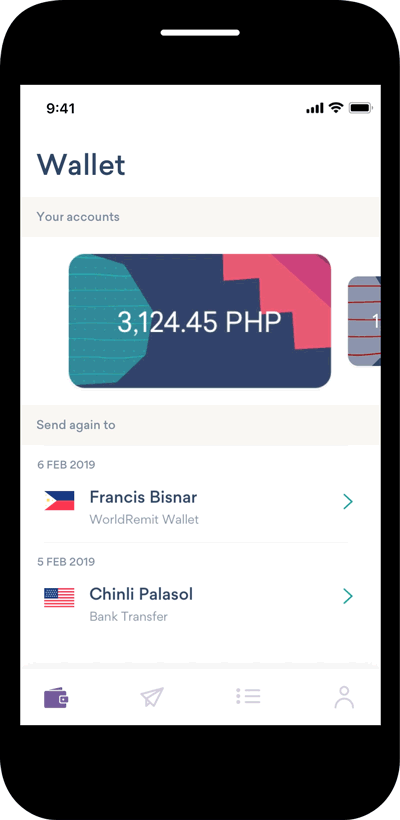
A multi-currency WorldRemit Wallet. Source: worldremit.com
In the app, you can create a multi-currency WorldRemit Wallet that allows you to easily store, send, or receive money. This option is now only available in two countries but is planned to expand. The fund limit is set at $2000 for security purposes
Pros & Cons
➕ Numerous options for receiving money, including both cash and digital solutions.
➕ Low fees, fair exchange rates.
➕ Information about transaction progress is sent to both sides via SMS or e-mail.
➕ Social impact for the emerging economies includes legal and safe ways to receive money in unbanked segments.
➕ Mobile payments create a financial history for all unbanked citizens.
➕ Registration and sending money doesn’t require visiting any offices. It happens online and is quick and simple.
➕ Many payment options for the sender.
➕ A few first transactions can go free of charge with special promo codes.
➖ Business options and multi-currency digital wallets are only starting to develop. They are available to a very limited extent.
➖ The number of sending countries is quite small.
➖ Customer Support doesn’t have a live chat. They can be reached by phone or e-mail only. The average response time for e-mails is 24 hours.
➖ If your recipient visits a third party to withdraw mobile money funds they may be charged a fee.
SEE ALSO:





